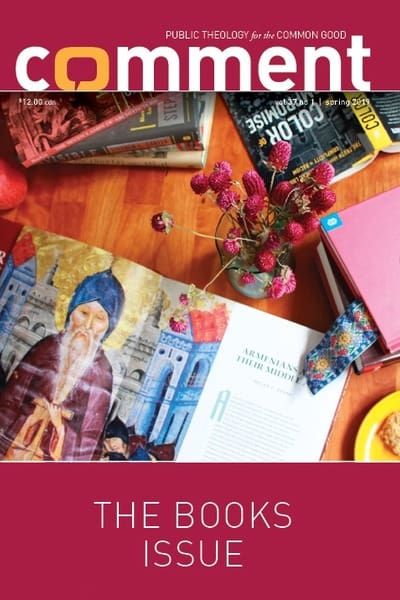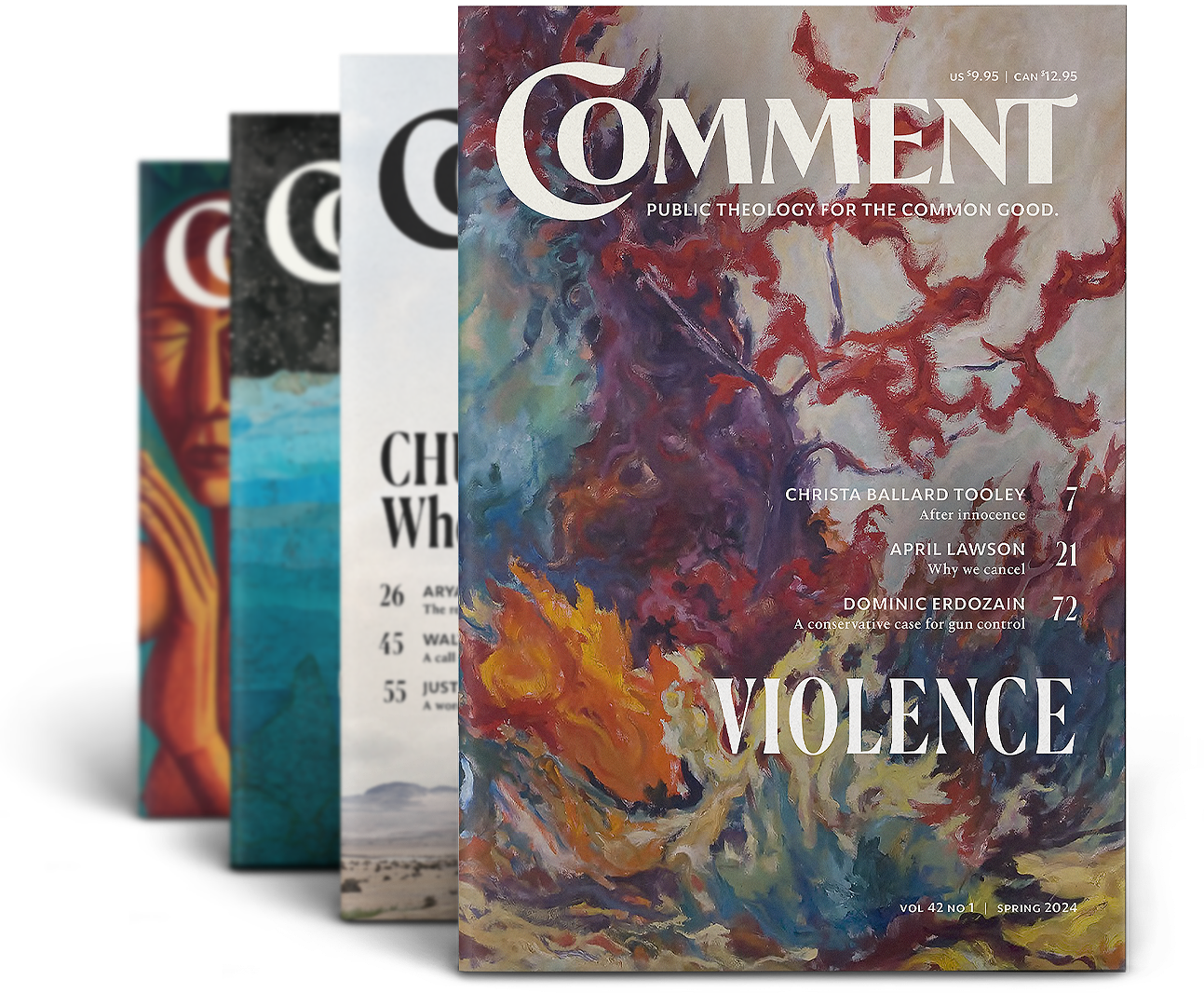I’m grateful to Jamie Smith (now presiding over Image), Brian Dijkema, Doug Sikkema, Kathryn de Ruijter, and the rest of the Comment team for the opportunity to help with the March 2019 issue. The pieces in this issue, in departure from the usual practice, won’t be connected by a single theme, except perhaps their common tribute to the appeal of miscellany.
In 2011, at the invitation of Alissa Wilkinson, I wrote a piece for Comment called “Magazine as Microcosm,” in which I argued that reality itself is miscellaneous, so that each issue of a magazine is a microcosm of the whole shebang. Of course, I conceded, our grasp of the whole is always radically imperfect: “We are not creators, Tolkien said, but subcreators: an ugly word, yes, but useful. The little worlds we make in imitation and homage are bound to be flawed. Yet even the artful miscellany to be found in a single issue of a single magazine—gathered from a storehouse that seems, as in a fairy tale, to be always full, no matter how much is taken out—gives us a foretaste of the Great Feast to come.”
This talk about miscellany is charming, you might say, but glancing over the issue, I see that it contains pieces on immigration, on the early stages of European settlers’ ruthless displacement of Native Americans, on Christians’ complicity in the persistence of racism in the United States, and on the Cold War prospect of mutual annihilation. These are subjects that should bring us to our knees. How does this miscellany give us “a foretaste of the Great Feast to come,” except by radical contrast? There seems to be a distasteful intellectual connoisseurship at work here.
And you didn’t even mention the piece on Armenia! I won’t engage in a competition to see who is most alert to horrors past and present, who is most convicted by guilt (individual and collective), who is most comprehensively committed to justice and the reforms it demands. I will say it’s instructive how often the word “intellectual” (noun and adjective alike) is used as a pejorative (often deployed by intellectuals themselves, including a number whom I know and respect).
Reality will always exceed our grasp. If that strikes you as a sophomoric pronouncement, I must say that I wish a lot more people had attained such sophomoric wisdom. This single issue of a single magazine draws our attention both to John Ruskin and Tyler Cowen: incommensurable! And yet we can read them both with profit.
So, is that what it’s all about? Seeing, understanding . . . what about doing?
Yes, doing, certainly. Alan Jacobs emphasizes that, for Ruskin, “We have no right, by anything we do or neglect, to disregard our heirs. And woe be unto us if we forget this.” And just in case we haven’t got the message, Alan adds this: “It cannot be stressed too strongly that for Ruskin there is no aspect of our lives, no matter how apparently trivial, where this principle does not apply.”
So, by all means, doing. One thing that influences our doing is our sense of time. We do this or that in the morning, this or that in the afternoon, this or that at night. And our sense of time isn’t limited to the daily round or the seasons of the year; we have (whether clearly articulated or not) a sense of “the time” in which we live.
Our eldest daughter, Anna, has drawn my attention to “preppers” in the “American Redoubt” (encompassing Idaho, Montana, Wyoming, and sections of eastern Oregon and Washington). They include serious survivalists who are prepared (according to their lights) for apocalyptic political and social collapse, along with a wide range of less intensely committed folk who share a sense of impending collapse but who differ from one another in many ways as well.
Many more people today (including many I know) are going about their everyday business yet are also expressing their sense that the time in which we live is especially awful. To a degree this widespread sentiment is connected with predictions of catastrophes caused by climate change; also it’s linked with the conviction that “global capitalism” is somehow the source of our malaise. Certainly this notion of a civilizational train wreck has been more widespread in the United States since Donald Trump was elected, but it preceded his ascendancy and is by no means limited to the American sphere. (In an odd way, this mood reminds me of the “end times” talk I heard regularly in the mostly Baptist churches we attended when I was a boy in the 1950s.)
Are these assessments of “our time” accurate? How would we go about determining that, insofar as we can? Reading book reviews and essays, and at least some of the books they address, is among other things a form of intelligence-gathering. It gives us radically varied perspectives on times past and present, unsystematically accumulated. I’m particularly attracted to books that kindle the sense of wild particularity I spoke of at the outset (the essence of miscellany): the endlessly surprising idiosyncrasy of the Real.
One such book, reviewed in this issue by Sarah Ruden, is Stephen L. Carter’s Invisible: The Forgotten Story of the Black Woman Lawyer Who Took Down America’s Most Powerful Mobster. The lawyer in question was Carter’s grandmother Eunice Hunton Carter; her brother, Alphaeus, became a dedicated Communist, lost his job as a result, and was briefly imprisoned, but flourished in Africa after his release. Here’s the conclusion of Invisible:
Today the situation of the darker nation is enormously better than it was in the days when Alphaeus and Eunice crashed against the wall of race. To insist, as some still do, that nothing has changed is an act of willful ignorance—and an insult to the generations who have beaten at the wall. But to say that the wall is weakening is not to say that it is no longer there. The barrier of whiteness has proved resilient. Those who shelter behind the wall are constantly shoring it up, often without realizing what they are doing. No matter. The wall is weakening. It did not fall in the lifetimes of Eunice and Alphaeus. It will not fall in ours. In the end, however, the logic of justice and the demands of freedom will overwhelm it.
That concluding paragraph is important, but lifting it from its place is in some respects misleading. “History is so easy to forget,” Carter writes, a few lines above his conclusion. A simple sentence—sophomoric, some might say, but I would call it resonant, especially coming as it does at the end of a sustained commitment to remembering.
You rise to eloquence, but I remain unpersuaded.
Ah, well. I hope you’ll dip into these pages anyway, and maybe something will catch your eye—a blue-skinned Jesus, perhaps.




